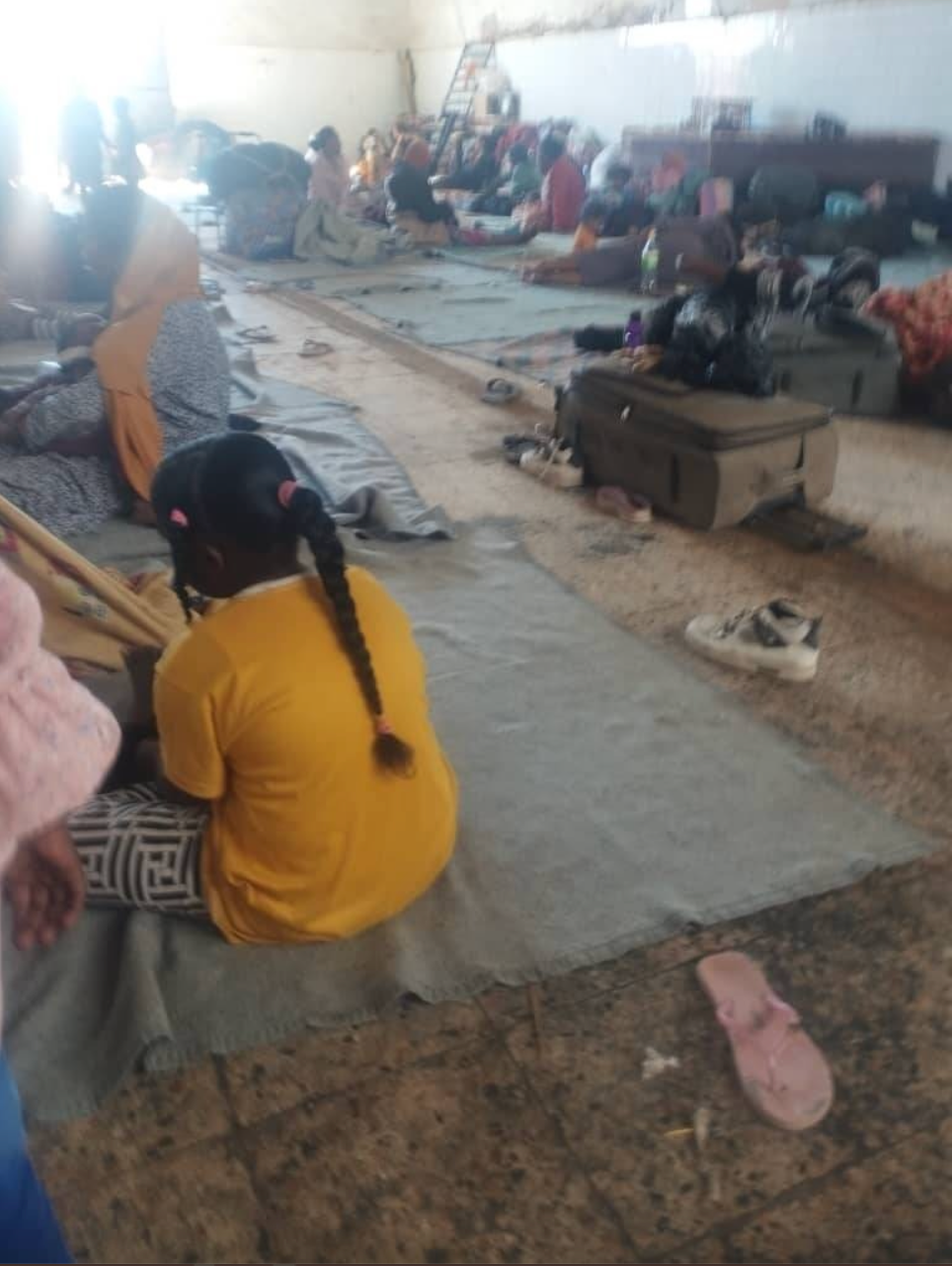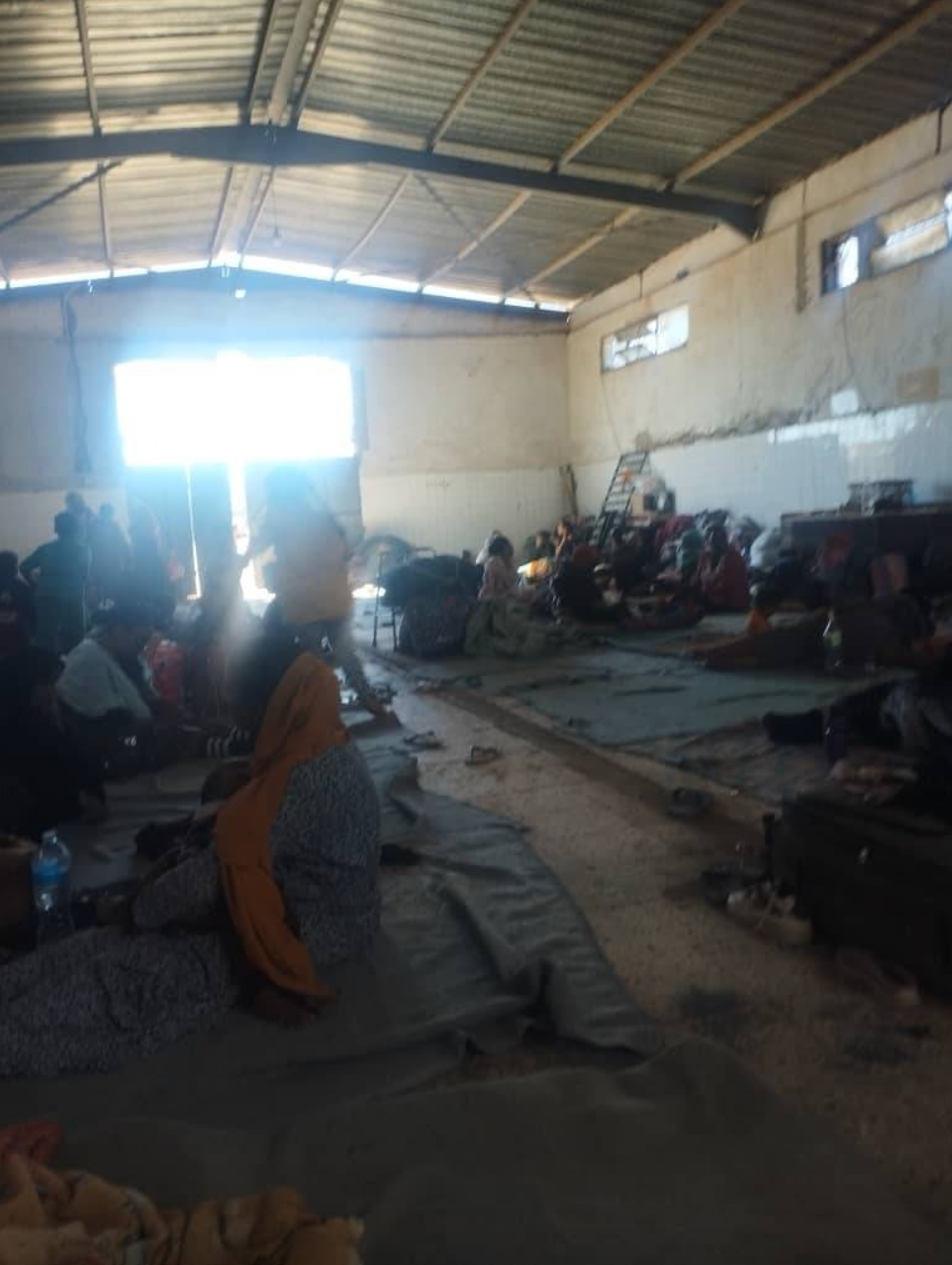
June 19 2024: The Egyptian authorities must immediately cease the mass arbitrary arrests and unlawful deportations of Sudanese refugees who had crossed the border into Egypt seeking refuge from the conflict in Sudan, Amnesty International said today, in a new report published ahead of World Refugee Day.
The report, “Handcuffed like dangerous criminals”: Arbitrary detention and forced returns of Sudanese refugees in Egypt, reveals how Sudanese refugees are rounded up and unlawfully deported to Sudan – an active conflict zone – without due process or opportunity to claim asylum in flagrant violation of international law. Evidence indicates that thousands of Sudanese refugees have been arbitrarily arrested and subsequently collectively expelled with the UN High Commission for Refugees (UNHCR) estimating that 3,000 people were deported to Sudan from Egypt in September 2023 alone.
“It is unfathomable that Sudanese women, men and children fleeing the armed conflict in their country and seeking safety across the border into Egypt, are being rounded up en masse and arbitrarily detained in deplorable and inhumane conditions before being unlawfully deported,” said Sara Hashash, Deputy Regional Director for the Middle East and North Africa at Amnesty International.
“Egyptian authorities must immediately end this virulent campaign of mass arrests and collective expulsions. They must abide by their obligations under international human rights and refugee law to provide those fleeing the conflict in Sudan with safe and dignified passage to Egypt and unrestricted access to asylum procedures.”
"Egyptian authorities must immediately end this virulent campaign of mass arrests and collective expulsions."
-Sara Hashash, MENA Deputy Regional Director
For decades, Egypt was home to millions of Sudanese people studying, working, investing or receiving healthcare in the country, with Sudanese women and girls, as well as boys under 16, and men over 49 exempt from entry requirements. Around 500,000 Sudanese refugees are estimated to have fled to Egypt after the armed conflict erupted in Sudan in April 2023. However, in the following month, the Egyptian government introduced a visa entry requirement for all Sudanese nationals, leaving those fleeing with little choice but to escape through irregular border crossings.
The report documents in detail the ordeals of 27 Sudanese refugees who were arbitrarily arrested with about 260 others between October 2023 and March 2024 by Egypt’s Border Guard Forces operating under the Ministry of Defence, as well as police operating under the Ministry of Interior. It further documents how the authorities forcibly returned an estimated 800 Sudanese detainees between January and March 2024 who were all denied the possibility to claim asylum, including by accessing UNHCR, or to challenge deportation decisions.

The report is based on interviews with detained refugees, their relatives, community leaders, lawyers and a medical professional; as well as a review of official statements and documents and audiovisual evidence. The Egyptian ministries of defence and interior did not respond to Amnesty International’s letters sharing its documentation and recommendations, while the Egyptian National Council of Human Rights, the national human rights institution, rejected the findings claiming that authorities comply by their international obligations.
The spike in mass arrests and expulsions came after a prime ministerial decree issued in August 2023 requiring foreign nationals in Egypt to regularize their status. This was accompanied by a rise in xenophobic and racist sentiments both online and in the media as well as statements by government officials criticizing the economic “burden” of hosting “millions” of refugees.
It has also taken place against the backdrop of increased EU cooperation with Egypt on migration and border control, despite the country’s grim human rights record and well-documented abuses against migrants and refugees.
In October 2022, the EU and Egypt signed an €80 million cooperation agreement, which included building up the capacity of Egyptian Border Guard Forces to curb irregular migration and human trafficking across Egypt’s border. The agreement purports to apply “rights-based, protection oriented and gender sensitive approaches”. Yet, Amnesty International’s new report documents the involvement of the Border Guard Forces in violations against Sudanese refugees.
A further aid and investment package, under which migration is a key pillar, was agreed in March 2024 as part of the newly announced strategic and comprehensive partnership between the EU and Egypt.
"By cooperating with Egypt in the migration field without rigorous human rights safeguards, the EU risks complicity in Egypt’s human rights violations."
-Sara Hashash, MENA Deputy Regional Director
“By cooperating with Egypt in the migration field without rigorous human rights safeguards, the EU risks complicity in Egypt’s human rights violations. The EU must press Egyptian authorities to adopt concrete measures to protect refugees and migrants,” said Sara Hashash.
“The EU must also carry out rigorous human rights risk assessments before implementing any migration cooperation and put in place independent monitoring mechanisms with clear human rights benchmarks. Cooperation must be halted or suspended immediately if there are risks or reports of abuses.”
Arbitrary Arrests From Streets and Hospitals
The mass arrests have mostly taken place in Greater Cairo (encompassing Cairo and Giza) and in the border areas in the governorate of Aswan or inside Aswan city. In Cairo and Giza, police have conducted mass stops and identity checks targeting Black individuals, spreading fear within the refugee community leaving many afraid to leave their homes.
Following arrest by police in Aswan, Sudanese refugees are transferred to police stations or the Central Security Forces camp, an unofficial detention place, in Shallal region. Those arrested by Border Guard Forces in Aswan governorate are detained in makeshift detention facilities including warehouses inside a military site in Abu Simbel and a horse stable inside another military site near Nagaa Al Karur before being forced into buses and vans and driven to the Sudanese border.
Conditions in these detention facilities are cruel and inhumane, with overcrowding, lack of access to toilets and sanitation facilities, substandard and insufficient food, and denial of adequate healthcare.
Amnesty International also documented the arrest of at least 14 refugees from public hospitals in Aswan, where they were receiving treatment for serious injuries sustained during road accidents on their journeys from Sudan to Egypt. Authorities transferred them – against medical advice and before they had fully recovered – to detention, where they were forced to sleep on the ground after surgery.
Amira, a 32-year-old Sudanese woman who fled Khartoum with her mother was receiving treatment at an Aswan hospital following a car crash on 29 October 2023 that left her with fractures to the neck and the back. Nora, a relative of Amira, told the organization that the doctors told her she would need three months of medical care, but after just 18 days police transferred her to a police station in Aswan where she was forced to sleep on the ground for around 10 days.
Cold and Rat-Infested Detention Facilities Before Collective Expulsions
Amnesty International’s Evidence Lab reviewed photos and verified videos from January 2024 of women and children sitting on dirty floors amidst rubbish in a warehouse controlled by Egyptian border guards. The former detainees said the warehouses were infested by rats and pigeon nests and those detained endured cold nights with no appropriate clothing or blankets. Men’s warehouse conditions were overcrowded, with over a hundred men crammed together and limited access to overflowing toilets, forcing them to urinate in plastic bottles at night.
At least 11 children, some under the age of four, were detained with their mothers at these sites.

Israa, who has asthma, told Amnesty International that guards at the overcrowded horse stable near Nagaa Al Karur village ignored her request for an inhaler, even when she asked to buy one at her own expense.
After periods of detention ranging from a few days six weeks, police and Border Guard Forces handcuffed males and drove all detainees to the Qustul-Ashkeet border crossing and handed them to Sudanese authorities, without individualised assessment of risk of serious human rights violations if returned. None was given the opportunity to claim asylum even when they had registration appointments with the United Nations High Commissioner for Refugees (UNHCR), asked to speak to UNHCR or pleaded not to be sent back. Such forced returns violate Egypt’s international obligations under human rights and refugee law, including the principle of non-refoulement.
Border Guard Forces expelled Ahmed, his wife and two-year-old child together with a group of roughly 200 detainees, on 26 February 2024, after detaining them for six days in Abu Simbel military site.
Since the conflict in Sudan began, Egyptian authorities have failed to provide statistics or acknowledge their policy of deportations.
© 2024 Amnesty International
